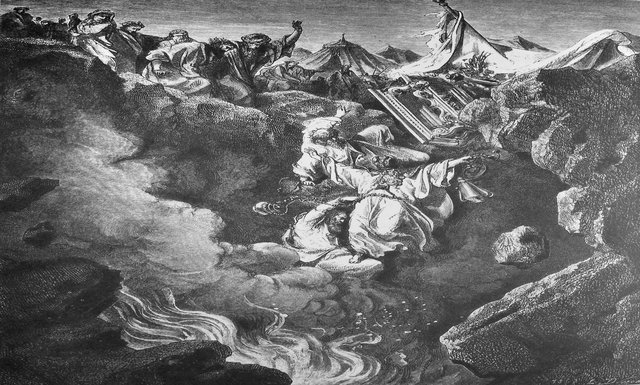This week’s Torah reading teaches the importance of humility and warns against lusting for power, as Korach did.
By Rabbi Ari Enkin, rabbinic director, United with Israel
This week’s Torah portion is Korach (Numbers 16:1–18:32), named after the villain of the story. To make a long story short: Korach and his rabble-rousers decide to protest – rebel, actually – against Moses. They accuse him of taking too much power for himself. One thing leads to another, God gets involved, and shortly thereafter Korach and Co. are swallowed up by the earth. The nation learns that Moses and Aaron are not power hungry, but rather, they were appointed by God – against their will, in fact!
How was it made clear that Moses and Aaron were not in it for the glory?
After the rebellion of Korach, God performed a miracle with Aaron’s staff, which proved the authority of Moses and Aaron. The staff was kept “on display,” so to speak, so that Moses’s and Aaron’s leadership would never again be challenged.
As the verse states:
“And God said to Moses: ‘Bring the staff of Aaron before the Testimony as a safekeeping, as a sign for rebellious ones; let their complaints cease from Me that they not die’”
The next verse states that “Moses did all that God had commanded. So he did.”
The commentators ask why there is a need to repeat the fact that Moses did what God commanded. Telling us once would certainly have been enough, not to mention that no one would have suspected Moses of not doing what God had commanded him! Why the repetition? Why the emphasis?
The Midrash (Talmudic parable) teaches that when Korach and his supporters assembled against Moses, the great leader trembled at thought of the developing controversy and infighting that was sure to follow. He collapsed in panic; his strength left him.
It is explained the Moses was exceptionally distressed, considering that the rebellion was now the fourth offense that the people had committed against God since leaving Egypt. Once again, Moses was forced to pray on their behalf, begging God to forgive them and spare them from the punishment they deserved.
The Midrash offers a parable to explain this. There was once a prince who offended his father, the King. The King’s friend begged for mercy on behalf of the son, and the King was appeased. This happened a second and a third time. When it happened the fourth time, the friend of the King became exasperated, saying, “How many times can I bother the King?”
Moses felt the same way. First, the people sinned by building a Golden Calf. Moses prayed for them and they were forgiven. Then they sinned by complaining that they wanted meat. Moses prayed for them and they were forgiven. Then it was the incident of the spies (last week’s reading). Again, Moses prayed for them and they were forgiven. Now this? Moses was just beside himself and unsure of whether he could again approach God on behalf of the nation.
Korach Rebellion: Direct Attack on Moses
But here’s what you might not have been expecting:
The rebellion was a direct attack on Moses, his leadership and his authority. This time, it was personal. What would most leaders have done? Or to make the question a little more local: What would Iranian, Syrian, Yemeni, Libyan…leaders do if a group had questioned their authority? You guessed it: Off with his head, to say the least.
But not Moses.
Moses was concerned merely because the people were rebelling against God and he would have to turn to God once more to seek their forgiveness. He cared not for his own honor. He cared about the rebellion against God and about saving the Jewish people. That’s it.
So back to our original question: Why the emphasis that “Moses did as God had commanded him?”
The answer is that the staff was put on display to testify that Moses and Aron were the Divinely chosen leaders. Moses, in his humility, might have resisted carrying out an order intended to give him honor and authority. Moses was the most humble of all men.
Therefore, the Torah emphasizes that Moses put the staff on display simply because God had commanded him to do so.
This is the greatness of Moses. And this is the greatness that all leaders should strive for: Putting aside personal needs and interests for the sake of the people.
Do You Love Israel? Make a Donation - Show Your Support!
Donate to vital charities that help protect Israeli citizens and inspire millions around the world to support Israel too!
Now more than ever, Israel needs your help to fight and win the war -- including on the battlefield of public opinion.
Antisemitism, anti-Israel bias and boycotts are out of control. Israel's enemies are inciting terror and violence against innocent Israelis and Jews around the world. Help us fight back!
